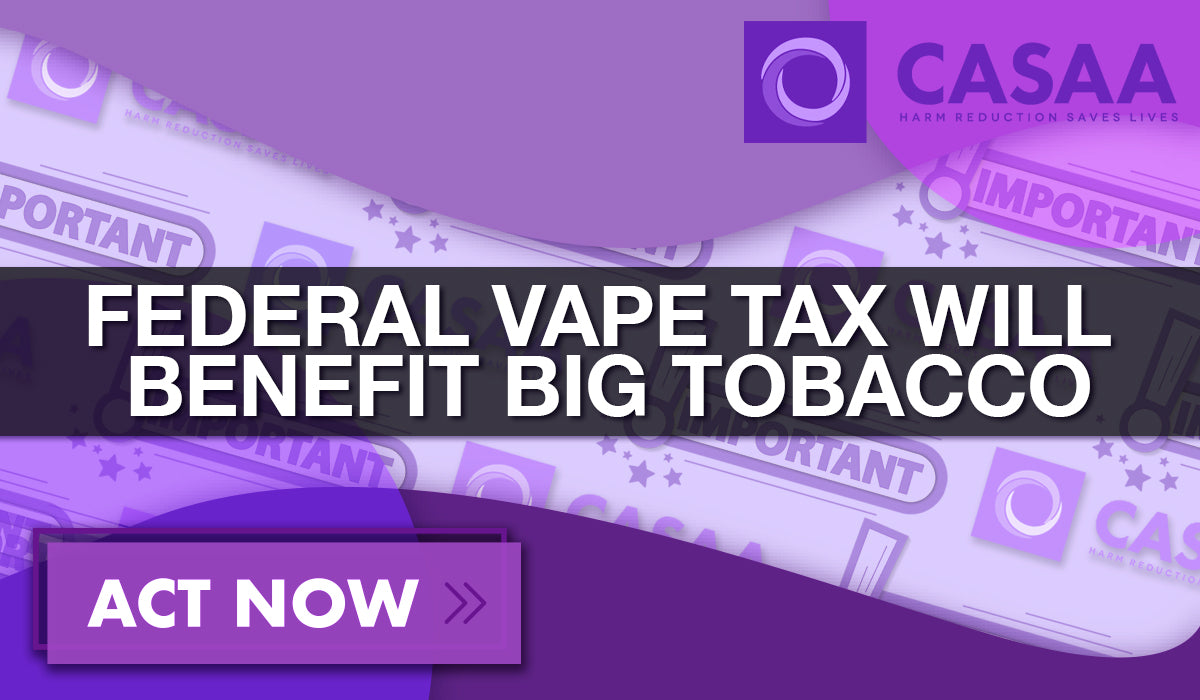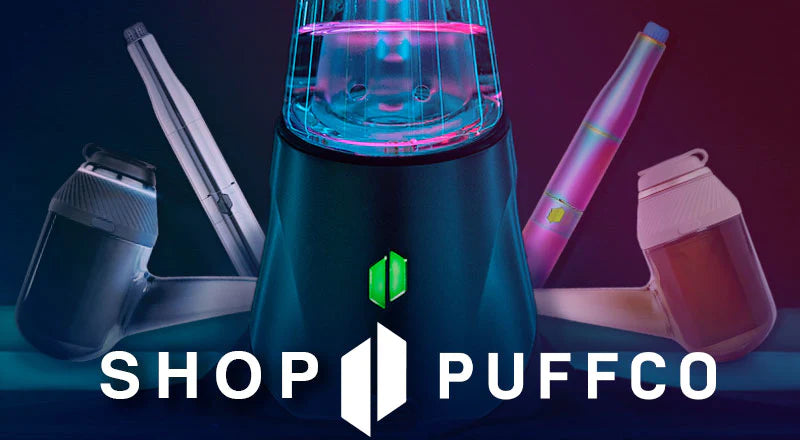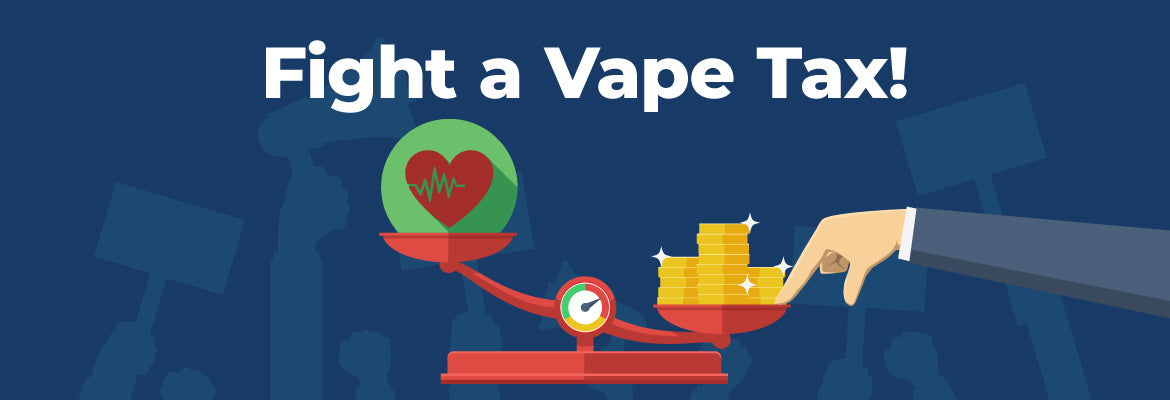
Proposed Federal Tax Incentivizes Cigarettes and Punishes Vapers
A proposed bill, introduced to both Houses of Congress, would impose the first federal tax on vaping products and nicotine pouches. If passed, vaping would become significantly more expensive than smoking. The tax would represent a win for Big Tobacco, with vapes taxed at approximately 5.5 cents per milliliter of nicotine. Cigarettes would be taxed at 1 cent ml, based on the industry standard 9mg of nicotine per cigarette.
Introduced by Illinois Democrat Dick Durbin and co-sponsored by eight other Senate Democrats, Senate Bill S 2929 claims to equalize taxes between cigarettes and other nicotine products.
The House version, HR 5715, was introduced by Illinois Representative Raja Krishnamoorthi, also a Democrat. Both Illinois politicians have been involved in constant anti-vaping initiatives, ranging from proposed flavor bans to demanding the scientists at the FDA find in their favor, i.e. banning flavored vapes, during the PMTA process.
Please take the time to make your voice heard by clicking on the image below or visiting their CASAA's National Call to Action to Stop HR 5715 and S2929.
Tax Burden on Vapers
Measured on a milligram-to-milligram basis, cigarettes would have a nearly five-fold advantage in terms of tax burden when compared to nicotine from vapes. Snus and smokeless products also fair poorly compared to Big Tobacco's most popular products.
Here is how the federal tax would break down on different types of vapes. Cigarettes will be hit with a tax rate of about $2.00 per pack.

Scientifically Indefensible
The timing of this tax corresponds with a recent FDA study that found in areas with vape flavor bans, vape sales drop and cigarette sales increase. Check out our deep-dive in our featured investigation: FDA Study Shows Vape Flavor Bans Increase Cigarette Sales.
This is not Durbin’s first effort at a tax equity bill that would deny adults access to combustible cigarette alternatives and funnel them back into the arms of the Tobacco Industry. The Tobacco Tax Equity Act of 2021 was scuttled at the last minute by Nevada Senator Catherine Cortez Masto.
In their call to action, vaping advocacy group CASAA stated:
According to the FDA, serious tobacco scientists, the UK’s Royal College of Physicians, and several other international government health agencies, tobacco products exist on a “continuum of risk.” These groups are also aware that nicotine is not the source of harm. While CASAA members and other nicotine consumers are experiencing a reduction of harm by moving down the risk continuum with products like e-cigarettes, snus, and nicotine pouches, sponsors of HR 5715/S 2929 are displaying willful ignorance about the tobacco risk continuum.
Details of Federal Vape Tax
If HR5715/S 2929 are enacted, consumers will end up paying approximately 5.5 cents per milligram of nicotine in vape productions. Cigarette smokers will pay approximately 1 cent, based on the average content of 9mg of nicotine per cigarette.
A vaper who uses a typical 15ml disposable vape with a nicotine strength of 50mg/ml would pay $2.75 per ml of e-liquid, or $41.25 in tax per device. This would be on top of the device cost, local taxes, states taxes, and shipping if ordered online. Landed, a disposable would cost $70 or more, instead of $20 to 30 dollars.
Lower nicotine freebase juices would not be hit as hard, but a 120ml bottle of 6mg/ml nicotine strength e-liquid would face $40 in additional federal taxes.
The already exorbitant price of per ml of a Juul or Vuse Alto pod, which hold 0.7ml and 1.8ml respectively, would mask the harshness of the tax hike. But each Juul pod, with a nicotine strength of 59mg/ml would cost an extra $2.25.
This seemingly lower bill is function of the small pod capacity and to vape 30ml of Juul nic salts you would have to pay nearly $100 in federal taxes. With the highest nicotine strength, it faces the most onerous overall burden.
More Humane Alternatives
The decision to punish adult vapers and funnel them onto cigarettes is a curious one. The money raised by these taxes will surely be offset by expenses incurred when cigarette smoking rates increase. Unless we are to believe that nicotine abstinence and prohibition will work this time, despite the FDA's recently released research that found flavor bans increase cigarette sales.
RJ Reynolds efforts at regulatory capture make sense, they stand to profit if their competition is legally barred from the market and end users must pay a five-fold higher tax rate. They have the money and legal firepower to buy the fealty of politicians and navigate bureaucratic hoops.
But the willingness of Senators, purporting to despise smoking and claiming to be obsessed with protecting children from harm, to present bills that further Big Tobacco's agenda is quite odd.
The concept of a useful idiot was falsely attributed to Karl Marx. It describes a person propagandizing for a bad cause without fully comprehending the cause's goals.
Compare US efforts at nicotine prohibition that reward Big Tobacco and strip adult vapers of superior alternatives to the UK's more humane approach to vaping. Their National Health Service hosts both a "Using e-Cigarettes to Quit Smoking" website and "Vaping to Quit Smoking" resource page.
Such a stance is unthinkable in the US. Of course, the NHS is a publicly funded healthcare system and has taxpayer skin in the game. With profit motive removed, they have no choice but to identify the most cost effective health modalities that promote optimal outcomes at a reasonable cost.
Many alternative treatments have been axed by the NHS due to cost or lack of scientific basis, including herbal therapies and homeopathic approaches supported vigorously by King Charles himself. Vaping remains in their good graces because it works, and because the punishment of adult vapers for having the temerity to use nicotine and cigarette alternatives has not been normalized by those in positions of power.










Leave a comment
This site is protected by hCaptcha and the hCaptcha Privacy Policy and Terms of Service apply.